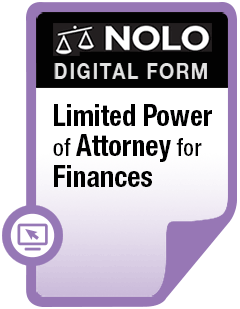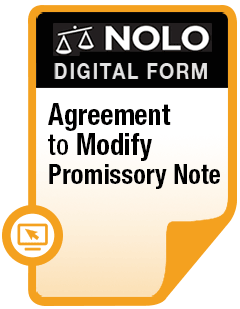Protect yourself with a promissory note when making loans to family and friends.
If you lend money to a friend or family member, you might feel that person's word or a handshake is enough to seal the deal. Unfortunately, memories fade, and disagreements can arise.
Protect yourself by creating and signing a promissory note to detail and record the loan agreement terms.
What Is a Promissory Note and How Does It Work?
A "promissory note" is a written promise, basically an IOU, to pay money to someone. The note document serves as written evidence of the debt. It will contain the loan's terms, such as the loan amount, payment amount, interest, late fees, etc.
A promissory note also says what the lender can do if the borrower doesn't repay the loan.
Why Do We Need a Promissory Note?
Having a written promissory note can help solve problems, such as if your family member or friend stops paying or disagrees with you about the amount owed. If the borrower doesn't meet the repayment terms, you can sue and get a judgment for the amount owed, court costs, and maybe attorneys' fees.
if you're lending a large amount of money (say, a couple hundred or thousands of dollars), it's generally a good idea to not only prepare a formal promissory note.
What Are the Different Types of Promissory Notes?
You and the borrower should agree on a plan for repaying the loan. For instance, you'll need to decide on the repayment terms and whether you'll require the loan to be secured.
Some of the different types of promissory notes include:
- a note that requires repayment in installments of equal amounts
- a promissory note payable in a lump-sum payment, and
- a promissory note with a balloon payment.
Installment Payments in Equal Amounts
In an installment payment plan, the borrower makes equal monthly (or yearly) payments for a specified number of months (or years) until the loan is paid off.
If you charge interest, part of each payment goes toward interest, and the rest goes toward the principal. The loan and interest are fully paid when the borrower makes the last payment.
Lump-Sum Payment of Principal and Interest
With many loans to friends and family members, the borrower pays off the loan in one payment at a specified future date. This payment includes the entire principal amount and the accrued interest, if any.
Again, consult online calculators to determine the total interest amount due under your particular plan.
Balloon Payments
Although rarely used in loans between family and friends, you can also structure a loan with a balloon payment. In this plan, the borrower makes equal monthly payments for a set amount of time. The payments can cover either interest and principal or interest only. These payments pay off some, but not all, of the loan.
Then, the borrower makes one final, large payment (called a "balloon payment"), which pays off the rest of the principal and the remaining interest.
Securing the Loan with Property
In a secured loan, the borrower pledges property, like a car or house, as collateral to guarantee payment. If the borrower doesn't pay, the lender gets to repossess (or can foreclose on) the property.
Most personal loans are unsecured. However, if you want security for a personal loan, consider what property will secure the loan and what documents you'll need.
- Tangible personal property. This kind of property is physical personal property, such as a car, jewelry, or computer equipment. Complete a security agreement along with the promissory note.
- Real estate. If you want to secure the loan with real estate, you need a mortgage or deed of trust. Consult a real estate lawyer.
- Intangible personal property. This type of property includes assets, such as copyrights, trademarks, patents, and ownership rights in a business. If you want to secure your loan with intangible personal property, consult a lawyer.
Do I Have to Charge Interest on a Promissory Note?
Charging a friend or family member interest strikes some people as ungenerous. But this view is often based on a misconception about the function of interest, which is to fairly compensate the lender for using money that could have been earning interest elsewhere.
How to Calculate Interest on a Promissory Note
Once you've figured out the total amount borrowed, the interest rate, and the time over which the borrower will make payments, you can use an online calculator to calculate the amount of each payment. Or you can use a printed amortization schedule, available from commercial lenders, business publishers, and local libraries.
Can a Promissory Note Have 0% Interest?
Nevertheless, when lending a relatively small amount to friends or family, you might prefer to lend the money interest-free.
Interest-Free Loans and the IRS
If it learns about your interest-free loan, the IRS can "impute" interest. It will treat you as though you had earned interest and require you to report it as taxable income.
For most personal loans, this won't be a problem. Uncharged interest can be treated as a tax-free gift if the total amount given to the borrower is less than the gift-tax exclusion amount for the calendar year.
What Is the Standard Interest on a Promissory Note?
While promissory notes don't have a standard interest rate, many states have usury laws that cap the rate of interest a lender can charge for loans—often in the range of 10% to 20%. You're probably not likely to charge your friends and relatives an excessive interest rate, so the usury laws are unlikely to present a problem. Still, check your state's usury law.
Can You Write Your Own Promissory Note?
You can create your own promissory note using a template or an online fillable form. For example, you can create your promissory note with Nolo's Promissory Note. Or, if you need more help, consult with a lawyer.
Can I Make Changes to a Promissory Note?
If you want to change a promissory note, you must first get permission from everyone who signed the note. So, you'll need to write up another document, and have everyone sign it. To get help preparing a document to modify a promissory note, get Nolo's Agreement to Modify Promissory Note.
Talk to a Lawyer
Need a lawyer? Start here.
How it Works
- Briefly tell us about your case
- Provide your contact information
- Choose attorneys to contact you
- Briefly tell us about your case
- Provide your contact information
- Choose attorneys to contact you



